EXTENDED! CO residents can apply FOR FREE through December 1st. Apply now!
Secure your scholarship offer in just 2-3 days through December 17! Get started.
No waiting. No guessing. Join us for Instant Decision Day on December 3. Register now.
EXTENDED! CO residents can apply FOR FREE through December 1st. Apply now!
Secure your scholarship offer in just 2-3 days through December 17! Get started.
No waiting. No guessing. Join us for Instant Decision Day on December 3. Register now.
This reflection was written by current Korbel graduate student, Erin Mitchell (Master of Public Policy, 2026).
On October 7, 2025, I had the distinct honor of attending the Axios Denver Newsmakers event, hosted by Korbel’s own Scrivner Institute of Public Policy, and sponsored by The Denver Foundation. The event featured an engaging and insightful question-and-answer session with Denver Mayor Mike Johnston, focused on the proposed Vibrant Denver Bond, a five-part, $950 million general bond question that will appear on the November 4, 2025, ballot. Beyond listening to the discussion, I also had the incredible opportunity to speak directly with Mayor Johnston, gaining firsthand insight into how local leaders approach complex policy challenges.
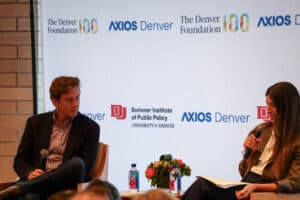
The event began with an overview of the proposed bond, setting the stage for an in-depth conversation about how public financing can shape the city’s future, which provided a rare opportunity to hear directly from the mayor about one of the most significant public financing proposals in Denver’s recent history. The Vibrant Denver Bond is designed to fund critical capital improvement projects across the city, addressing infrastructure, housing, and community development needs. Mayor Johnston emphasized that the bond’s five components, affordable housing, transportation and mobility, parks and recreation, public facilities, and economic development, represent strategic investments in Denver’s long-term vitality and inclusivity.
During the conversation, Johnston highlighted the city’s urgent need to expand affordable housing and improve public spaces to maintain Denver’s quality of life as the population continues to grow. He explained that the bond would not increase property tax rates but would instead reauthorize expiring debt, allowing the city to reinvest in essential infrastructure without overburdening taxpayers. This approach, he argued, reflects responsible fiscal management while ensuring the benefits of growth are broadly shared.
Following the bond discussion, the audience was given the opportunity to ask questions, which touched on issues such as homelessness, climate resilience, and economic equity. Mayor Johnston spoke candidly about balancing Denver’s rapid development with sustainability and social responsibility. He stressed the importance of public engagement and voter participation, noting that every Denver resident has a stake in shaping the city’s future.
This event truly reflected the civic spirit of collaboration between local government, academic institutions, and philanthropic organizations. Axios Denver’s format, focused, conversational, and journalistic, allowed thoughtful dialogue rather than scripted speeches. This approach ultimately led myself and several other graduate students having the unique opportunity to speak one-on-one with Mayor Johnston about the upcoming ballot issues and other pressing policy issues affecting Denver and the state of Colorado.
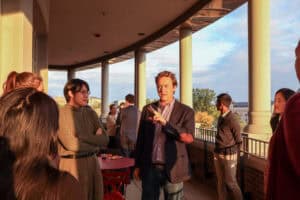
Mayor Johnston spoke openly and enthusiastically with us about everything from our future career goals to local development projects, including plans for the new Mile High Stadium and its role in Denver’s economic and recreational growth.
As a Public Policy student, I spend much of my time studying elected officials, their policies, and their impact on society, but I never expected to speak face-to-face with one. Korbel made that possible by facilitating these conversations with the mayor. His friendly, down-to-earth demeanor quickly put our group at ease, and as we stood on the Sie Complex balcony chatting as equals, it struck me that elected officials are, at their core, people like us. That moment brought to life what our work in public policy is all about: creating meaningful connections and striving, regardless of affiliation, to make our communities stronger and more equitable.
For me, attending the Axios Denver News Makers event was both informative and inspiring. It underscored the importance of civic participation and policy literacy, reminding attendees that democracy functions best when communities are informed and engaged. As Denver prepares for the upcoming vote, the discussion served as a timely reminder that the city’s growth and vibrancy depend on the collective choices of its residents. For me, as a student, it was a rare chance to witness these principles in action and to see firsthand how public policy shapes real communities, and it was a reminder that our studies are not just theoretical but are preparing us to actively contribute to the future of the city and the world around us.
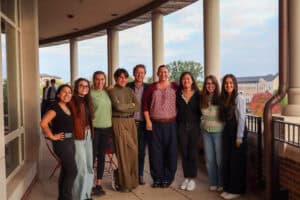
Each spring, Professor Janney Carpenter’s Social Impact and Sustainability Lab offers students a unique opportunity: ten weeks of hands-on project work that connects classroom theory with engaged community work. Within the first few seminars, students are introduced to leaders from local and global institutions that face real-world challenges, like nonprofits, funders and impact investors, and other social enterprises. Soon after, students partner with these organizations, gaining hands-on experience that often kicks off a new career with renowned institutions like the American Red Cross, the Gates Family Foundation, and others.
This class’s designation as a “lab” is a meaningful one. The stakes are real, the deadlines matter, and the work students produce doesn’t sit on a shelf. It influences how organizations make decisions about sustainability, funding, and community impact.
“I come up with students’ projects by working with the client ahead of time,” Professor Carpenter said. “I develop a scope of work for each project and then present everything to the students. They rank which ones they like the most. Then, I put them into teams, which gives them about eight weeks of project work.”
With Professor Carpenter’s scope of work in hand, students develop a plan together and communicate directly with the client. Most of the time, their projects involve systems mapping, which tasks students with understanding how the organization works and identifying key stakeholders, partners, and obstacles. Current Korbel graduate student Aidan Smith, who recently shared his experience as an AmeriCorps fellow, used this class to interview internal staff at the American Red Cross.
“Aidan and his team partner did interviews locally,” Professor Carpenter said. “They spoke with Veterans Affairs (VA) offices for the Red Cross, and they identified an issue I’d never considered. The VA was going digital, moving all appointments and announcements online. But that was excluding people who were less digitally inclined, particularly seniors. Aidan and his partner figured that out and became part of the solution. They connected the VA with nonprofits who specialize in helping seniors get more comfortable with digital tools.”
Aidan’s story is one of many. Another graduate student and AmeriCorps fellow, Kip Newman, worked with the African Community Center — a refugee resettlement organization — by helping them grapple with new funding challenges under the current administration. Others worked with a D.C.-based B Corp, Cambium Carbon, to help create a supply chain that transports chopped wood from cities into a supply chain that turns trash into recycled products. The scope of these projects highlights the many paths that students can take, and with Professor Carpenter at the helm, every project leaves a tangible mark on the organizations and communities they serve.
Before joining Korbel as an adjunct professor, Professor Carpenter started at JPMorgan in Corporate Finance. She eventually took those skills into three decades of consulting work at the intersection of finance, philanthropy, sustainability, and education. As an expert in all these fields, she knows firsthand what today’s organizations need from emerging professionals.
“I teach students to ask the right questions in these spaces, which isn’t easy,” she shared. “How do you balance social or environmental impact goals with financial sustainability? How can organizations develop strategy with insights and feedback from customers and communities? How can you align strategy with available funding resources? How do you choose and measure the indicators of progress? All organizations need data for continual learning so they can adapt to changing market conditions and client needs.
But Professor Carpenter insists those challenges mirror the realities of social impact work. One common revelation for students is that scaling an organization — particularly a nonprofit — isn’t always about growth. “There are lots of ways to scale impact,” she said. “It could be increasing awareness, sharing information to inform policy decisions, or finding corporate funding partners.”
Based on her course evaluations, Professor Carpenter shared the biggest takeaway students often have: “You don’t design the best solutions in a conference room. You do it by going out there and talking to people. That’s what this class helps students do, sometimes for the first time. Building the communities you want to see starts by being a part of them.”
The Social Impact and Sustainability Lab is a prime example of what makes Korbel distinctive: rigorous academic training that’s applied to solving real problems with practitioners in the field. Learn more about our master’s programs to see how you can gain the skills to make a greater impact in your career and community.
For nearly three decades, the International Career Advancement Program (ICAP), proudly hosted at the Aspen Institute, has stood at the forefront of building a stronger American leadership presence in international affairs and public policy. ICAP is a community, a catalyst, and a promise, which firmly believes that the United States will be stronger and more effective on the world stage when leadership is cultivated with excellence and vision.
What began in 1997 at the Josef Korbel School of Global and Public Affairs, as an initiative led by Dean Emeritus Tom Rowe, has grown into one of the nation’s most respected professional development programs, one that changes careers, transforms lives, and strengthens our country’s global impact. At its core, ICAP was created to open doors for mid-career professionals across government, nonprofit, and private sectors, and it continues to do so today.
“Most career development programs offer a sense of personal growth, but ICAP gave me more than that. It offered me a sense of motivation and purpose, gave me insights into my leadership style and was instrumental in getting me across the threshold into executive roles.”
- Amb. Carmen Cantor, ICAP Fellow 2012
ICAP fellows step into the program with the opportunity to gain mentorship from accomplished senior leaders, career advising, and a platform to engage with pressing policy challenges. Beyond that, the program creates a rare space to openly discuss personal and professional challenges, explore solutions with peers facing similar issues, and discover alternative leadership and management styles. Set in Aspen’s reflective mountain landscape, ICAP offers a transformative experience that blends leadership development, values-based career coaching, and policy dialogue with intentional opportunities for self-care and reflection. ICAP fellows build lifelong friendships and professional ties, supported by 20–30 mentors and career advisors, and join a growing global network of over 900 alumni through the ICAP Fellows Association. Together, this holistic approach equips fellows not only with the tools for immediate growth, but also with a lifelong community dedicated to mutual support and leadership excellence.
“I really enjoyed my time at ICAP Aspen! Going into it, I was intimidated by the caliber of professionals and experts in the room. But as I got to know them, I realized they were some of the most down-to-earth people who genuinely cared about my success.”
- Victory, Korbel Graduate Assistant for ICAP; MA, International Security, 2027
At its core, ICAP believes that America’s leadership is strongest when it draws on the full talent, creativity, and dedication of its people. Year after year, the caliber of ICAP Fellows proves this true. From Ambassadors and White House appointees to CEOs, nonprofit executives, and founders of innovative ventures, ICAP alumni have become leaders whose voices shape global affairs with distinction.
Each year, ICAP selects a highly competitive cohort of 30–40 mid-career professionals. Together, they begin their journey in Washington, D.C., before traveling to Aspen, Colorado, where the mountain setting provides space for reflection and growth. While the week-long retreat is the heart of the program, fellows also join the ICAP Fellows Association, a vibrant network of more than 900 alumni who remain deeply connected, offering long-term support and collaboration.
The impact speaks for itself. ICAP has been recognized by The Economist magazine as among the top 10 Diversity Networks globally. Its fellows now serve at the highest levels of government, in boardrooms, classrooms, and across the global stage. Graduate students at the Korbel School also benefit, serving as ICAP interns and assistants, gaining invaluable exposure to leaders who inspire and guide them.
As ICAP looks ahead, one truth remains clear: the demand for thoughtful, ethical, and capable leadership in global affairs has never been greater. And ICAP will continue to rise to meet that need, empowering leaders today to shape a better tomorrow.
Learn more about ICAP here.
From the steel city of Pueblo, Colorado to the halls of government, recent Korbel alumnus Jacob Topping’s journey is a testament to what drive, purpose, and community roots can make possible. A proud first-generation college graduate, Jacob grew up with a strong belief that people from small towns deserve a voice in decisions that shape their future. After graduating with his Master of Public Policy (MPP) in 2024, Jacob has dedicated his career to elevating those voices. “I was born and raised in Pueblo,” he shared, “and I am now the Southeastern Regional Representative for Senator Michael Bennet.”
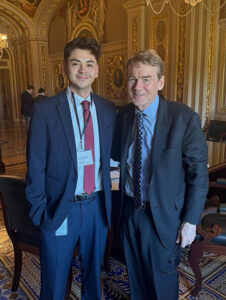
Jacob sat down for an interview while on the road with the Colorado (CO) Project, a community effort led by the Scrivner Institute of Public Policy to build a state platform for deliberation on issues affecting Colorado. This is one of many initiatives where he gives back to his community. As a kid in Pueblo, he developed a lifelong desire to serve, always believing that public policy isn’t something that happens far away. It affects real people, real families, and real communities like his.
Yet ambition alone wasn’t enough. Jacob knew he would have to build his path step by step by expanding his skillset and growing his professional network. That’s what drove him to Korbel.
Pueblo Roots, Public Service Goals
Jacob’s pride in his Pueblo roots is central to who he is. His hometown shaped his values, work ethic, and determination to pursue a career that could make a difference, prompting him to first imagine a career in government as a high school senior. The spring before graduation, his school district went on strike. For most students, it was a disruption; for Jacob, it was an awakening. “That was my first dip in the waters of the political side and governance side of local policy,” he recalled. “Seeing how that really impacts not only our educators but our students in the district definitely sparked my fire for this world.”
From there, the idea of public service never left his long-term plans.
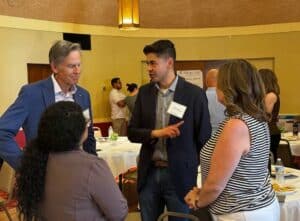
Growing up in Pueblo reinforced Jacob’s sense of responsibility to his community. His parents ran a small business, which gave him an early education in hard work and the importance of showing up for others. “I’ve always been in touch with the community down there,” he said. “Learning the values of hard work definitely informed my long-term career aspirations. I think that’s why I ended up in the role that I did.”
Today, Jacob’s role with Senator Michael Bennet allows him to work not only in Pueblo but across southeastern Colorado, connecting residents, counties, and nonprofits with resources and opportunities. Every day, he draws on the lessons he learned growing up: hard work, community responsibility, and the value of showing up for others. He wants to help shape policies and programs that make a tangible difference in people’s lives. For Jacob, public service isn’t just a career; it’s a way to give back to the place that first inspired him to imagine what’s possible.
From Classroom Connections to Real-World Impact
When Jacob arrived at Korbel for his MPP, he found a community eager to provide support and open doors, helping him secure his post-graduation career in Senator Michael Bennet’s office.
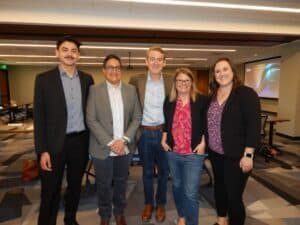
Jacob attributes much of his success to the faculty mentorship he received during his program, particularly from Professor Naazneen Barma. “Dr. Barma was a tremendous asset in my academic endeavors,” he said. Through her guidance, he also became involved with the CO Project, strengthening his connection to Senator Bennet and introducing him to more of Colorado’s public servants and their passion for community work. This year’s CO Project initiative—CO Project 2.0: Rural Renaissance—is a community-led effort to shape the future of Colorado through its rural communities, like those in the Southeastern Region where Jacob now works.
Between participation in the CO Project, and mentorship from faculty like Dr. Barma, Jacob graduated feeling prepared to launch a career of impact. “The MPP degree set me up perfectly for this role with Senator Bennet,” he said. “I came in as a first-generation student, and having the full support of not only the faculty but the community at Korbel is definitely something that I leaned on a lot.”
Korbel’s support—both during his studies and after graduation—has remained a constant, providing the skills, relationships, and resources that allow him to thrive in public service
A Full-Circle Moment
Now, in his full-time role with Senator Bennet, Jacob covers southeastern Colorado counties, helping communities access resources and advancing legislative priorities. “Working for Senator Bennet has given me a new perspective on the real, on-the-ground impact we can have in communities like Alamosa County, Pueblo County, or out east in Prowers County,” he says. “Being able to be a real champion for rural Colorado is definitely something that I’ve been able to really appreciate in this role.”
Looking back, Jacob sees his career path as a return home, literally and figuratively. “My first internship experience was during undergrad when I was a student at CSU Pueblo, back in Senator Bennet’s office in 2019. So, this is almost as full circle as you can get,” he said with a smile.
For Jacob, what makes the journey meaningful is not just the professional milestones, but the chance to serve the community that raised him. While Korbel gave him the skills and connections to do that, Pueblo gave him the values to keep going.
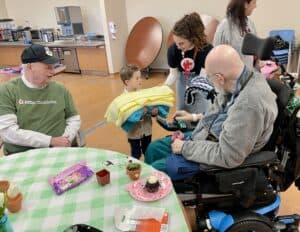
For alumnus Abigail (Abby) Russell, her job at the American Red Cross is the extension of a career that began in graduate school. “I was in the dual degree program,” Abby recalled. “I did a Master’s in Social Work and a Master’s in International Human Rights. And because I also completed Korbel’s Humanitarian Assistance Certificate, I needed internship hours for all three.” Her solution? To use the Korbel School’s Office of Career and Professional Development (OCPD) to facilitate an introduction to one of the world's most renowned humanitarian organizations. That conversation with the Red Cross was the catalyst for a career of community-driven impact.
As a graduate student, she worked with the Red Cross’s Disaster Cycle Services department, but her internship quickly evolved. “The director of the Service to the Armed Forces and International Services department found out about me and asked me to join her team, too,” Abby said. “She gave me all the training I needed to teach international humanitarian law, which became my second role there.” Abby ended up balancing two Red Cross internships across different departments, applying her dual training in real-time.

At the University of Denver’s School of Social Work, Abby would make another pivotal career move. She joined a faculty-led program called the Bosnian Transition, which was designed to be an immersive, short-term educational trip. But after learning so much about Bosnia during her time working under the School of Social Work’s Professor Ann Petrila, she decided to stay. “I packed everything up, left Denver, and moved to Bosnia without a job lined up. I just knew I wanted to be part of that community long-term.”
Within weeks, she was working with the Srebrenica Memorial Center and a women’s empowerment organization called Nahla. And when Professor Petrila brought new student groups to Bosnia, Abby stepped in as a field supervisor. “It was my first time officially mentoring graduate-level interns,” she said. “It’s not just about helping them complete tasks, it’s about supporting their professional development, connecting them to the local context, and continuing to guide them after the internship ends.”
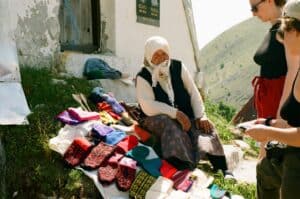
When Abby moved back to Colorado, her previous experiences facilitated by Korbel and the School of Social Work made her a shoo-in for full-time work with the Red Cross. Today, she’s the regional program manager for the local Colorado and Wyoming office, helping with their national effort called Community Mobilization. “We’ve been working on networking, expanding, and adapting our programs to fit into local communities across the United States better,” she said. “And then mobilizing those communities to be more independent and self-sustainable.”
Abby also supervises Korbel students who are interning with the Red Cross through the AmeriCorps internship program. “When I was first asked to supervise AmeriCorps interns, I said yes immediately,” Abby said. “It felt like a perfect opportunity to give back, not just to Korbel and the Red Cross, but to the next generation of humanitarian professionals.”
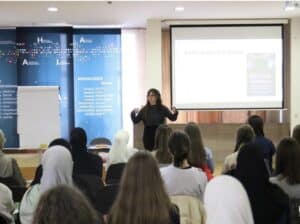
That full-circle moment—going from intern to supervisor, student to mentor—reflects the real-world impact of a Korbel education. Abby’s story shows that graduate study at Korbel isn’t just about academic theory. It’s about building the skills, relationships, and values that lead directly to global careers.
For prospective students wondering whether Korbel is the right fit, Abby offers a clear answer: “The support is always there. From faculty mentors to internship connections, I never felt alone. If you’re driven to make a difference, locally or globally, Korbel opens the doors. You just have to walk through them.”
At the Korbel School’s Frederick S. Pardee Institute for International Futures, research is more than an academic exercise; it’s about supporting a global community that tackles today’s most consequential issues - from climate and conflict to development and security.
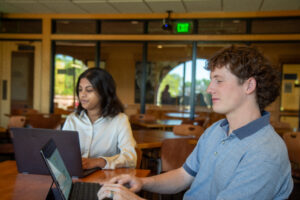
The Pardee Institute collaborates with people who are invested in our global future, including officials in governments, intergovernmental organizations, and international agencies, as well as practitioners who carry out their decisions and those with a stake in the downstream effects of those decisions.
At the heart of this work is the International Futures integrated assessment model, a one-of-a-kind global forecasting tool that helps identify and analyze the fundamental forces driving change over the coming decades, informing smarter policy decisions and more resilient planning. This powerful forecasting platform simulates how changes in one system - like health or energy - ripple across others, from governance to education to the environment.
But behind the sophistication of IFs and the breadth of Pardee’s research portfolio is a driving force that helps bring it to life: students. In the 2024-25 academic year, 88 University of Denver students, primarily from the Korbel School, played an essential role in advancing the Institute’s work. Organized into six specialized teams, these students contributed to everything from data modeling and diplomacy research to communications and operations - bringing both depth and agility to Pardee’s global initiatives.
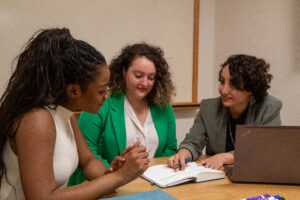
“The projects I worked on include Multilateral Treaties, UNGA, Embassies, and the IGOs. For each of these projects, I coded and vetted data, strengthening my attention to detail and improving my ability to work with complex datasets.”
-Maya Rai, Core Diplo
Some students work directly with the Pardee Institute’s flagship tool, the International Futures (IFs) model, contributing to both internal development and external research collaborations. Pardee Fellows - selected graduate students from the Korbel School - support scenario design, literature reviews, and client projects with global partners. Alongside them, the IFs Data Team maintains the model’s vast database, ensuring its accuracy and usability through technical work that supports long-term forecasting and real-world policy analysis.
Other teams focus on building the Institute’s empirical foundations. The Country and Organization Leader Travel (COLT) team, Pardee’s largest student cohort, maintains a one-of-a-kind dataset tracking the international travel of global leaders. Students gather and code open-source data, transforming it into structured insights that support diplomacy research. The Core Diplometrics team compiles data on international treaties, diplomatic representation, and organizational memberships, while the Perceived Mass Atrocities Dataset (PMAD) team contributed to a multi-year effort documenting mass atrocity events worldwide.
Meanwhile, the Institute’s communications and business operations are also student-powered. From managing Pardee’s web presence and writing research summaries to supporting HR, payroll, and event logistics, students help shape how the Institute functions and how its work is shared with the world. Their contributions ensure that Pardee’s insights reach diverse audiences - from policymakers to the public - with clarity, consistency, and professionalism.
Across all teams, students describe their experience at Pardee as transformative. They gain technical skills in data analysis, coding, and modeling; they refine their writing and communication abilities; and they learn to navigate the demands of collaborative, deadline-driven research. More than that, they find themselves contributing to projects with real-world relevance - projects that influence policy, inform global institutions, and shape public understanding.
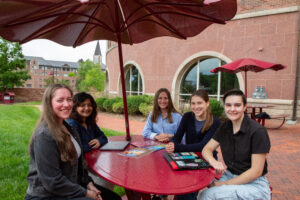
“The Pardee Institute has encouraged me to step out of my comfort zone and nurture my curiosity. My work here has refined my writing and critical thinking skills, equipping me for the professional world.”
-Wara Irfan, Marcom
As Director of Analysis Collin Meisel explains, this impact runs both ways. “Simply put, some of our research, like the COLT project, would not exist without our student research aides. Across this and many other projects, the unique perspectives that students bring, the questions they ask, the big and small suggestions they make, and the hard work they put in improves the work we do together in immeasurable ways. In turn, we aim to improve their professional lives and set our students up for future success, whether that be at a think tank, in government, an NGO, or whichever path they choose to carve in their career after Pardee.”
At the Pardee Institute, students don’t just get to join the conversation - they gain the skills to lead it, equipped with tools that last well beyond graduation. Their contributions are not auxiliary; they are essential. And in the process, these students are not only preparing for their futures - they’re helping to shape the future of global affairs.
For an in-depth look at the work taking place at the Pardee Institute, check out their 2024-2025 Annual Review.
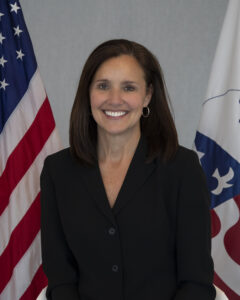
As Professor Carol Spahn prepares for her first quarter at Korbel, it’s no secret that international and public affairs face uncharted waters. But as Former Director of the Peace Corps during the COVID-19 pandemic, Professor Spahn’s expertise is leadership during uncertainty.
When explaining her approach to leadership, she offers a simple but powerful metaphor she picked up on a Colorado rafting trip: point positive. “Look at where you want to go, not at the rocks you want to avoid. Progress requires hope and your individual actions matter. Over time, they add up to something much bigger than yourself.”
That mindset — focusing on possibility rather than the rocks you want to avoid — has defined Spahn’s approach to leadership throughout her career. As the new Rice Family Professor of the Practice of International and Public Affairs, Professor Spahn brings the full weight of a career defined by bold leadership and global service. When the COVID-19 pandemic struck, Spahn — then Chief of Operations for the African Region at the Peace Corps — supported the evacuation of nearly 7,000 volunteers from over 60 countries, navigating shuttered borders and grounded flights in a race against time. It was a moment that shook the very foundation of an institution built on global presence and human connection.
Now, Professor Spahn brings her expertise to students at Korbel, ready to shape the next generation. “This is another highly transitional, disruptive time,” she said. “The most important thing is that we grab it and shape it. We can’t go back to where we were, but we can build what comes next.”
A Career Built on Pivots
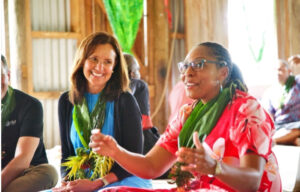
Growing up in Kansas in a large, practical family, the international stage seemed far away. While Professor Spahn would receive snippets of the world from her great-uncle, who was a Catholic missionary in Papua New Guinea, she never set foot east of the Mississippi until she headed to college in Washington, D.C.
“Being in D.C. was such a tremendous learning experience,” she said. “Suddenly, you’re surrounded by people from all over the world. It really broadened my perspective.”
Her practical roots led her to a degree in accounting, followed by a job offer with KPMG after graduation. But everything shifted during that last summer before she started, when she saved up for one of those “live on $4 a day” trips. It was meant to last only five weeks, just in time for her to start her new career. Instead, she found herself in Southern Turkey, standing at a public pay phone, calling KPMG to ask if she could postpone her start date. That call marked a turning point.
“I wanted to learn more,” she said, “as a global citizen and not as a tourist.” She later applied to the Peace Corps and was placed in Romania, just four years after the fall of the Berlin Wall. During her time there, she witnessed an entire nation’s economy shift from state-run systems to private enterprise, an experience that revealed both the challenges and opportunities of global transformation.
From there, her career spanned international finance, nonprofit leadership, and eventually her return to the Peace Corps — first as a country director, then as agency head. Each pivot, she said, was shaped as much by circumstances as by design.
“Life really is a series of turning points,” she reflected. “Oftentimes, you don’t control them. Family, health, global events - all shape your path. But if you stay open, each step can be a moment to learn and grow.”
Lessons in Leadership
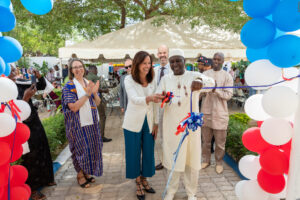
Former President Biden appointed Professor Spahn to be Acting Director of the Peace Corps during the pandemic, and she was unanimously confirmed by the Senate. The Peace Corps’ continued existence is owed, in part, to her leadership when there were no volunteers in the field. “Any disruption, especially large-scale disruption outside your control, forces you to ask: how do we maintain relevance?” Professor Spahn asked. “How do we move forward?”
Professor Spahn answered that question by mobilizing the entire agency around reimagining service, advancing equity, and delivering quality. Every employee had a role to play.
“For our back-office teams,” Spahn said, “we asked how we should standardize and streamline to improve efficiency. For our programmatic teams, we asked how we could contribute to the COVID response and be ready for a new reality when borders reopened. Importantly, we were intentional about maintaining our relationships and relevance around the world.”
Under Professor Spahn’s leadership, the Peace Corps streamlined operations, launched virtual service opportunities, mobilized staff to support in-country COVID responses, and even deployed volunteers domestically for FEMA’s vaccination rollout. Now, Spahn is eager to translate these lessons to the classroom.
Shaping the Future Together in Denver
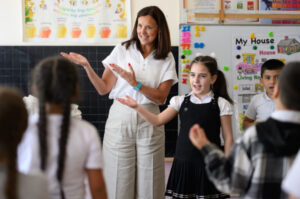
After decades of experience in finance, service, and international development, she is thrilled to begin this new chapter in Denver. Not only is she bringing her experience into the classroom, she’s also joining a community that holds significance for her family. Her daughter is a proud alumna of the Korbel School, making this next step personally and professionally meaningful. “When she started here, we got to know Colorado and the school,” Spahn said. “I was so impressed by the caliber of education she received and the welcoming community. Korbel has a tremendous reputation, and its vantage point in the West gives it a unique voice outside the Beltway.”
For Spahn, her return to Korbel is about more than teaching; it’s about building alongside students and colleagues during a moment of transition.
“There’s no playbook for where we are right now,” she said. “But that’s what makes this such an interesting time. The disruption is here. What matters is how we respond and reinvent.”
Professor Spahn will share more insights from her career in leadership and international development during the inaugural Dean’s speaker series event at Korbel. Don’t miss your chance to attend “Meeting the Moment: Leadership in a Turbulent World,” on Thursday, September 18, where she’ll join Dean Fritz Mayer for a fireside chat about navigating times of upheaval with resilience, adaptability, and purpose.
Colorado – From August 13–15, 2025, a diverse group of leaders from across Colorado will convene in the San Luis Valley as part of the Colorado Project’s Rural Learning Tour. The Colorado Project is a statewide initiative designed to advance shared prosperity and inclusive, sustainable growth in all regions of Colorado. It is convened by the Josef Korbel School of Global and Public Affairs and the Scrivner Institute of Public Policy at the University of Denver.
Now in its second iteration, the Colorado Project is focusing on the distinctive challenges rural communities face and the innovative, locally driven solutions they are generating. The Rural Learning Tour seeks to elevate this ingenuity, highlighting creative interventions in cost of living, sustainability, economic mobility, and entrepreneurship.
The San Luis Valley convening will spotlight organizations and initiatives in rural healthcare, food systems, affordable housing, and environmental stewardship, among others. There will also be a special focus on youth engagement and workforce readiness. Aaron Miltenberger, one of the co-hosts of this convening and President & CEO of the Boys & Girls Clubs of the San Luis Valley, emphasizes the importance of youth engagement in efforts like this: “Investing in our kids isn’t just the right thing to do—it’s how we build a stronger rural economy. When young people in the San Luis Valley get real skills, strong mentors, and the confidence to lead, they come back as nurses in Alamosa, teachers in Antonito, and business owners in Monte Vista. That’s how we grow—by investing in our own.”
Participants will visit Alamosa, Center, Monte Vista, and Mosca over the three days to tour a food distribution hub, learn about the revitalization of Main Street in Alamosa, meet with agricultural producers leveraging tech solutions for more sustainable production, and hear directly from community leaders from institutions like Adams State University, San Luis Valley Health, and the Boys and Girls Clubs of the San Luis Valley. Colorado Project participant Kurt Walker, a Korbel School alum and Ranch Manager at Pine Canyon Ranch, remarks “The San Luis Valley is proof that when we center equity and innovation, rural places can lead Colorado’s future.”
The San Luis Valley visit follows a successful convening in Sterling in June to better understand the context of northeastern Colorado. Following Alamosa, the Learning Tour will travel to Steamboat Springs and the Yampa Valley (October 8–10), where the conversation will turn to recreation-based economies and conservation finance. Each stop reveals distinct regional strengths, but the tour’s goal is unified: uncovering shared solutions for both rural and statewide prosperity across Colorado.
After years of dedicated work in international development, Abdelrahman (Bido) Ibrahim was ready for something bigger. His M.A. in International Development became the next logical step—a move that opened doors for him to have a broader platform with even greater social impact.
Through Korbel’s Pardee Institute, Bido landed an internship with the African Union Development Agency, also known as AUDA-NEPAD. For an Egyptian citizen like Bido, it was the perfect fit. “Working with a group like AUDA-NEPAD is exactly what I envisioned doing,” he said. “This is why I went into development in the first place.”
A Hands-On Role in Africa’s Future
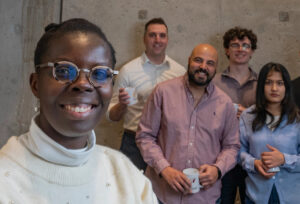
While connecting with Assistant Professor Dr. Jonathan Moyer at a meet-and-greet, Bido applied for a brand-new fellowship, got it, and spent his first year working closely with the Pardee Institute team.
Using Pardee’s International Futures (IFs) model, Bido and fellow Korbel student Omar Aittakalla explored how countries could contribute to the African Union’s 2063 Development Agenda —an ambitious vision for the continent’s future. In his work, Bido builds relationships with AUDA-NEPAD members, crafts development proposals, and works on high-impact presentations for African nations.
“We provide the information,” Bido explained. “We tell them what we think, but it’s ultimately their decision to include, adapt, or omit ideas.”
“We’re not in the driver’s seat,” emphasized Dr. Moyer, Director of the Pardee Institute. “Our role is to listen, provide the tools, and support their vision. The real work of setting policies and making change? That’s entirely AUDA-NEPAD’s responsibility.”
Networking with Leaders in Development
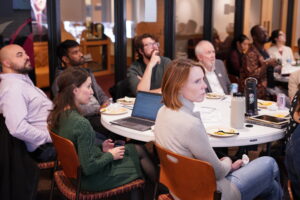
Bido met AUDA-NEPAD members in person for the first time when they traveled to Denver in 2024 to collaborate on development proposals. The African Union representatives also hosted events to connect students with the world of policy and government work. Meeting AUDA-NEPAD members face-to-face was a standout moment for Bido. “You see the human side of things that Zoom or Teams can’t show you. It’s so motivating—it makes you want to work harder and do better.”
His dedication earned him a second role working directly with AUDA-NEPAD and eventually a full-time staff position at Korbel. While juggling work and studies isn’t easy, he says the rewards are worth it. “The more involved I got, the more I realized this is exactly how I want to make a difference.”
A Unique Perspective on International Relations
As an Egyptian working on African development goals in the U.S., Bido brings a nuanced perspective to his role. “There’s this fatigue in the Middle East and Africa about the West telling us what to do,” he explained. “That’s why AUDA-NEPAD is so powerful—it’s Africans leading development for Africa. Pardee supports that balance, helping without taking over.”
Looking ahead, Bido is finishing his M.A. while continuing his impactful work with AUDA-NEPAD. For him, it’s about more than career growth—it’s about being part of a brighter, self-determined future for Africa.
Curious about how Pardee’s IFs model works? Learn more here. Want to dive deeper into AU’s Agenda 2063? Check it out here.
Summer at the Korbel School isn’t just a break from the classroom — it’s a launchpad for careers in international affairs and public policy.
During the ten-week break, students can take advantage of Korbel’s connections with government institutions and influential local leaders. Many graduate and undergraduate students participate in summer fellowships, often with the guidance of the Office of Career Professional Development (OCPD) to help with applications and professional introductions. In just one summer, these fellowships can help open doors that kickstart an entire career.
This summer, Mason Rothenberger, Nancy Idehen, and Haley Graham each took on ambitious summer fellowships. From shaping legislation in Denver to engaging with international development in Tanzania, they gained skills and perspective that will shape their careers for years to come.
Mason Rothenberger (BA ’25): Govern for America Fellowship
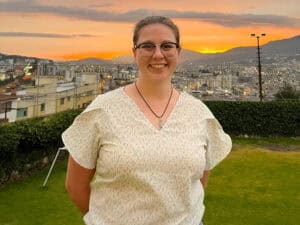
Mason Rothenberger, a recent graduate who double majored in International Studies and Spanish, is heading into a two-year public service commitment through the Govern for America Fellowship. The competitive program pairs early-career professionals with state agencies to drive impact at the local level.
Rothenberger was elated when she got the news that she’d be starting her post-graduation journey working with the Colorado Department of Local Affairs. “Not only do I have the opportunity to analyze housing policy,” Rothenberger said, “but I can engage with stakeholders in a way that is meaningful to them. And I can shape my future path forward, too.”
The Department of Local Affairs plays a crucial role in connecting state and federal funding with local housing initiatives—a perfect fit for Rothenberger’s interests. “They take the state-allocated funds from the federal government and connect smaller projects to that big pool of money. In my division, I’ll focus on housing projects directly.”
For Rothenberger, this opportunity is a perfect chance to make connections and get experience to prepare her for her long-term career goals. Her ultimate goal is to find a government job where she can make education more accessible and sustainable. “If I make the life of at least one child filled with more potential – because they could develop literary skills and get a civic education – then that’s a career that matters in my book.” Her long-term vision is anchored in rebuilding trust in public institutions. “If I can help create a system that people believe in and feel their voice is heard, I could be happy for the rest of my life.”
Nancy Idehen (MA ’26): Urban Leaders Fellowship
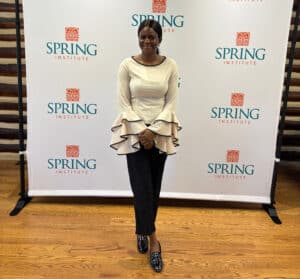
For Nancy Idehen, a master’s student in Global Economic Affairs (GEA), the summer is about getting to the heart of policymaking through the Urban Leaders Fellowship. She’s been paired with the Spring Institute in Denver and will spend the summer crafting and shaping real-world policy alongside elected officials.
“Everything seems so exciting. I'm so pumped,” Idehen shared. “I've already ironed what I'm going to wear. I feel like the most exciting part is that we’re working with elected officials and driving policies. Sometimes, there can be a gap between studying and actually getting experience. At Korbel, that’s where the intersection is: policy work. And Korbel is helping me get to do it.”
Beneath her enthusiasm lies deep experience and purpose. Idehen came to DU from Nigeria, where she studied international diplomacy and was active in politics. “My background has always been public policy,” she said. “Back home, I was involved in the political landscape. Here, I’m learning how the U.S. policy system works and getting hands-on experience while doing it. It’s very exciting.”
To Idehen, this work is about bringing ideas into action. “Policy work sounds so abstract,” she said, “but these are things that affect communities and millions of lives. So it is extremely, extremely important.”
Haley Graham (BA ’27): Critical Language Scholarship (CLS)
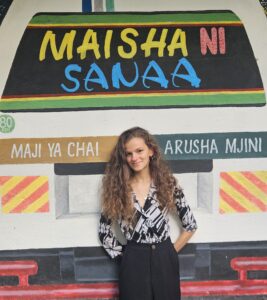
For second-year undergraduate student Haley Graham, the summer holds an entirely different kind of adventure. A recipient of the Critical Language Scholarship (CLS) for Swahili, Graham will spend eight weeks in East Africa immersed in intensive language study and cultural exchange.
“I've always wanted to go to Africa since I was a little girl,” she said. “But I never thought I would ever go there while learning. I'm most excited for being with a host family… having that intentional connection with someone who knows the culture and the community really well.”
The CLS program, run by the U.S. State Department and Department of Education, is designed to build language fluency in fields of critical need. Graham is prepared for the challenge: “By week two, they hope I’ll only be speaking Swahili.” Graham, a double major in International Studies and Sociology, traces her passion for language back to her early education. “I grew up learning Spanish, even though neither of my parents speak it,” she said. “Learning languages is a great way to connect to cultures.”
Swahili, though new to her, aligns with her broader goals in immigration law. “The Sub-Saharan Africa diaspora is one of the fastest-growing communities in the U.S., but very few lawyers speak Swahili,” she explained. “It makes legal access virtually impossible. I want to help make the legal field more accessible and diverse.”
Denver, Colorado: Connected to the Issues, Grounded in Community
Idehen, Graham, and Rothenberger say the communal focus of Denver and Korbel is ideal for enabling fellowship opportunities like these. Denver offers more than just scenic views—it’s a place where community, civic engagement, and professional development converge. The city’s political complexity and the Korbel School’s collaborative spirit create the perfect environment for fellowships, mentorship, and career exploration.
“I find a lot of joy in Colorado,” Rothenberger shared. “I really like the outdoorsy-ness of the state and the political nuance. I’m a very politically interested person, and there’s a lot going on in Colorado.”
Graham, who works in Korbel’s Office of Career and Professional Development (OCPD), credits the staff for helping her navigate the path to the CLS Scholarship. “Rae Ann, Gergana, and Jamie were absolutely wonderful in helping me figure out what direction I wanted to go with my application,” she said.
Idehen echoed the sense of connection, citing the strong support she’s received from both faculty and staff. “Denver is a very good place,” she said. “I’ve found community in Korbel. I’ve spoken to professors, administrative staff—people like Debbie Gaylin and Professor Lewis Griffith—and they’ve all helped bridge the gap so I don’t feel out of the loop. I feel like I’m connected and immersed.”
Community at Korbel: Beyond the Classroom, Into the World
At Korbel, the classroom is only the start of the experience for both graduate and undergraduate students alike. Summer interterm is a time for students to tap into the Korbel School's vast network, finding fellowships and scholarships in Denver and around the world. Whether through local housing initiatives, international language programs, or legislative experience, students are making the world a better place while advancing their careers.
Idehen, Graham, and Rothenberger encourage others at Korbel to pursue these summer opportunities—even if they seem intimidating at first—emphasizing how crucial faculty and staff support was to their success. “My essays have grown stronger, and I've definitely narrowed and tailored my focus to what I want to do,” Rothenberger said. “And as for the success aspect of it, don't look at it as a binary. You’re still going to learn even if you don't get the fellowship on the first or second time.”
At the Korbel School, support doesn’t end after you’re admitted — it begins there. Whether navigating career paths, applying for competitive fellowships, or finding a sense of belonging far from home, students know they’re not doing it alone. With dedicated staff, engaged faculty, and a network that spans across Denver and the globe, Korbel empowers students to take bold steps toward public service, global impact, and lifelong purpose.
Copyright ©2025 University of Denver | All rights reserved | The University of Denver is an equal opportunity institution